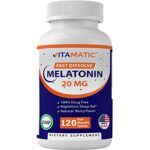How to Take Melatonin Properly

Data from the National Center for Health Statistics of the National Institutes of Health show that the use of melatonin supplements by adults in the U.S. more than doubled from 0.6 percent in 2007 to 1.3 percent in 2012, with an estimated 3.065 million adults reporting that they had taken melatonin during the past 30 days.
What is melatonin?
Melatonin is a hormone that is produced by the pineal gland in the brain. Melatonin levels vary in 24-hour cycles and are controlled by our body clock. Normally, its production is reduced by being in bright light. Levels increase at night. This is why it is often called ‘the hormone of darkness’. But in fact, the word melatonin itself means ‘skin whitening’. This is due to how it affects the skin in some animals. But it does not change the skin color of humans. Some plants have small amounts of melatonin as well. These include plants we use as food.
Where is it found?
Once it gets into the blood, melatonin goes to all parts of the body.
What does it do?
Melatonin appears to be important in helping regulate the internal body clock’s cycle of sleep and wakefulness. Other claims are made for it: it has anti-oxidant and free radical scavenging properties and some say it has anticancer and anti-aging effects, but there is no proof for this in humans. In regards to sleep, your blood melatonin level starts to go up about 2 hours before you go to sleep. It helps establish the conditions for sleep and your core body temperature to go down slightly at this time.
What can you use it for?
Melatonin is used to treat insomnia. But there are two ways that you can use it. The first is as a sedative, to make you feel sleepy. This is the most common use. The second is to help reset your internal body clock to a different time in conditions where it is out of synchrony with a time of day, such as with jet lag or advanced or delayed sleep phase syndrome. In these cases, melatonin therapy at night is often combined with Bright Light Therapy, applied in the morning (usually using outdoor light) in the case of jet lag or delayed sleep phase syndrome or in the evening (using special lights) in the case of advanced sleep phase syndrome (see also Delayed Sleep Phase Syndrome). Recently a synthetic form of melatonin has also been developed to treat depression.
In the United States, melatonin is available as an over-the-counter (OTC) sleep aid. You can find it at the drugstore or grocery store. The supplement will last in your body for about 5 hours.
Some people need additional melatonin to regulate their circadian rhythm. It’s used to help circadian rhythm disorders in:
• travelers with jet lag
• shift workers
• people who are blind
• people with dementia
• people who take certain medications
• children with neurodevelopmental disorders, like autism spectrum disorder
But melatonin isn’t just for sleeping better. It’s also used for migraine, attention deficit hyperactivity disorder (ADHD), and irritable bowel syndrome (IBS).
How to Use Melatonin Properly
The following tips are vital if you want melatonin to be effective:
Timing is key. Don’t take melatonin right before bed because it takes several hours for it to become effective.
If you are a night owl who normally stays up past midnight but would like to nod off around 11 p.m., take melatonin at 6 p.m. Conversely, if you go to bed at 8 p.m. and rise at 4 a.m., it’s better to take melatonin in the late morning or early afternoon.
Don’t overdo it. More isn’t better. Just 0.3 mg to 1 mg is sufficient, although many over-the-counter preparations may be upwards of 5 mg each. Overusing melatonin has consequences, including:
- Losing effectiveness over time because brain receptors get desensitized to it
- Worsening insomnia
- Headaches
- Nausea
- Next-day drowsiness, which can affect work performance
- Decreasing body temperature in the elderly
- Interacting with other medications
Think of melatonin like a Tylenol for sleep, when you have a headache or joint pain, you take Tylenol for a few days and then you stop.
Maintaining good sleep habits can decrease the need for melatonin, good sleep habits include:
- Developing a consistent sleep-wake cycle – going to bed and waking up around the same time every day, including weekends.
- Turning on the light first thing in the morning, so your body understands it’s time to be awake.
- Sleeping in a cool, dark room.
- Avoiding late-night exercise.
- Not drinking coffee in the afternoon or evening if you are affected by caffeine.
- Reserving your bed for sleep and sex only. That means don’t watch TV or read in bed.
- Getting checked for sleep apnea if you are waking up tired on a regular basis.
What Are the Side Effects of Melatonin?
Melatonin is not a normal medication, but you can experience side effects if you’re sensitive to the supplement.
The upside is that side effects of melatonin are usually mild and subside as your body adjusts.
Side effects vary, but include:
• Irritability
• Drowsiness
• Nausea
• Diarrhea
• Headache
Melatonin has also been known to exacerbate depressive symptoms, and should be used with caution in those suffering from depression.
Experiencing side effects doesn’t always mean that you should stop taking melatonin. The decision to stop will depend on the severity of your side effects, and whether they improve or continue.
Of course, it’s all about tolerance, too. If you take melatonin and repeatedly experience cramps or diarrhea the next day, you might be sensitive and need to consider other options for better sleep, perhaps chamomile tea or lavender oil.
To reduce the likelihood of side effects, always start with a low dose of melatonin. Only increase your dose as needed.
Many brands of synthetic melatonin contain 5 to 10 milligrams (mg) per serving, which is more than what people often need to regulate their sleep cycle.
Some adults only need a little melatonin, while others need more. Children can typically get by with a lesser amount, too.
This doesn’t mean that you can’t take 5 or 10 mg every night, but you should discuss this with your doctor first to ensure your body can handle a larger dosage.
Also, consult with your doctor if you take any prescription medication. This includes drugs for depression and diabetes, as well as anticoagulation medication, immunosuppressants, and corticosteroids.
Melatonin can also cause an inflammatory response in the body, so the supplement isn’t an ideal choice for people who have certain autoimmune diseases.





